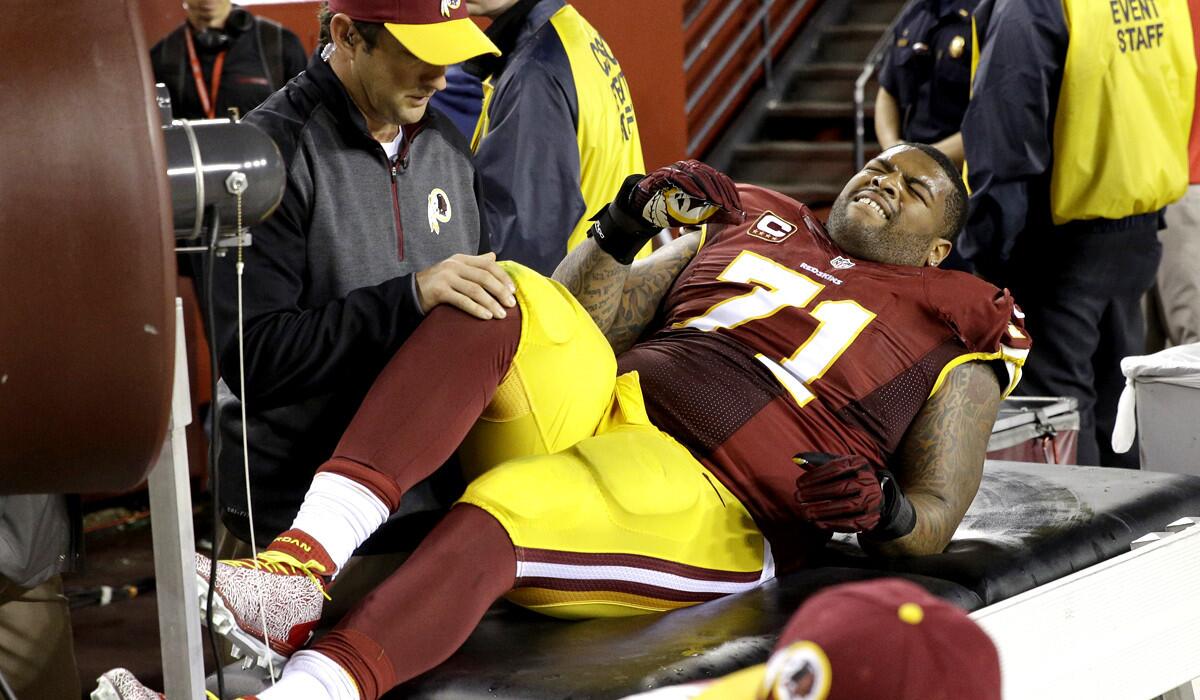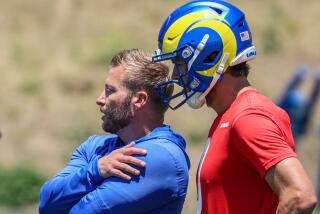Ask Sam Farmer: How contracts work for injured players

- Share via
Have a question about the NFL? Ask Times NFL writer Sam Farmer, and he will answer as many as he can online and in the Sunday editions of the newspaper throughout the season. Email questions to: sam.farmer@latimes.com¿
::
When a player gets hurt on the field or off the field, is his contract guaranteed? When so many players get hurt in training camp, are they then paid for the rest of the season?
Cary Spier, Santa Fe, N.M.
Farmer: An injured player gets paid for as long as he’s unable to play, no matter what his contract says. A team can’t release an injured player until he’s cleared. For most rookie contracts, players selected in the third round or later, there’s something called an “up-down,” which is two minimum salaries negotiated in the collective bargaining agreement. The “up” is the minimum active salary, which this season is $420,000, and the “down” ($303,000) is the minimum inactive salary. If a player is injured after eight games, he’s paid eight weeks “up” and nine weeks “down” (eight weeks, plus the bye). For most veterans, there is no “down.” It’s whatever he’s scheduled to earn. If a player gets hurt doing a football-related activity, he’s covered, no matter when it happens. So if he tears his anterior cruciate ligament in a May minicamp, he’s covered.
There are also injury settlements, which must be agreed to within five days of a player being placed on injured reserve. Say a player suffers a sprained ankle in training camp and it’s a three-week injury. The team can pay him for those three weeks, then release him. That player is eligible to return to that team after the number of weeks the settlement was for (in this case, three), plus another six weeks. So he would be eligible to return in any capacity by Week 10. That six-week “tax” is put in place so teams can’t stash players by saying they’re injured. If a player suffers an injury doing something unrelated to football, he’s placed on the reserve/non-football injury list. It’s at the discretion of the team whether the player is paid.
::
Has Green Bay running back Eddie Lacy regressed this season or is the offensive line at fault?
Jim Jacobs, Azusa
Farmer: Considering Lacy was my first pick in the fantasy draft, I’m scratching my head too. A couple of things to consider: He sustained a concussion in the opener at Seattle, at least his second in a year, so that could be an issue; and the Packers have played three teams that are tough against the run, the Jets, Lions and Seahawks — the Nos. 1, 2 and 4 rushing defenses. Chicago is 26th against the run, so here’s betting those lanes open Sunday.
More to Read
Go beyond the scoreboard
Get the latest on L.A.'s teams in the daily Sports Report newsletter.
You may occasionally receive promotional content from the Los Angeles Times.











